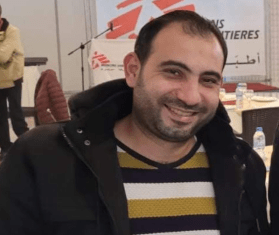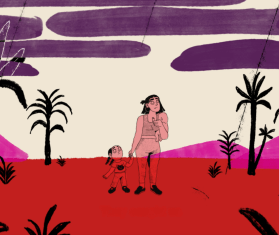As the number of caravans of people seeking asylum continues to grow in southern Mexico, Doctors Without Borders/Médecins Sans Frontières (MSF) is expanding its medical response through mobile clinics. MSF calls on Mexican authorities to address the needs of people affected by violence, provide safe migration routes, and reinforce the basic services available to people, including health care and spaces where they can rest with dignity.
A surge of needs as migration increases
Between January and August of this year, official data from the Mexican government reported an increase of 131 percent in irregular migration, compared to the same period in 2023, but anecdotal evidence suggests that the number is much higher.
“The violence to which people of all ages are exposed to as they pass through Mexico, including through kidnappings, extortion or sexual violence, forces them to travel in caravans as a protection mechanism,” said Ricardo Santiago, MSF project coordinator in southern Mexico. “The size of the caravans is growing considerably. If in September and October they were made up of just a few hundred people, now they are made up of thousands.”
Between September 24 and November 8 in the southern states of Chiapas, Oaxaca, and Veracruz, MSF teams carried out 855 medical consultations within eight caravans made up of several thousand people.

Poor sanitation and safety leave a wide range of medical needs
MSF treated conditions including acute respiratory diseases, musculoskeletal diseases, and skin and gastrointestinal conditions, due to the consumption of unsafe water, long walks, and high temperatures. We also treated those who had chronic diseases like high blood pressure, asthma, and diabetes, or who had experienced sexual violence .
Anxiety, acute stress, depression, and post-traumatic stress disorder (PTSD) were also treated, as patients frequently experienced mental health issues related to violence they faced during the journey.
“We witness every day the suffering and invisibility of people on the move and the impact on their physical and mental health,” said Daniel Bruce, head of the MSF base in Tapachula, Chiapas.
Bruce recalled seeing a man who had survived a kidnapping throw himself into a corner at a clinic in Huixtla, Chiapas, cover himself with clothing, and cry inconsolably.
“I asked him if he was okay, and he just hugged me and cried,” said Bruce. “His hands had been burned and he had been tortured during his captivity. The team was able to care for him, contain him, and give him the tools to deal with what he was experiencing.”

MSF in Mexico
MSF has been present in Mexico since 1985. It currently manages projects in Matamoros, Reynosa, Mexico City, Coatzacoalcos, Tapachula, and Suchiate, providing medical care to people on the move.




